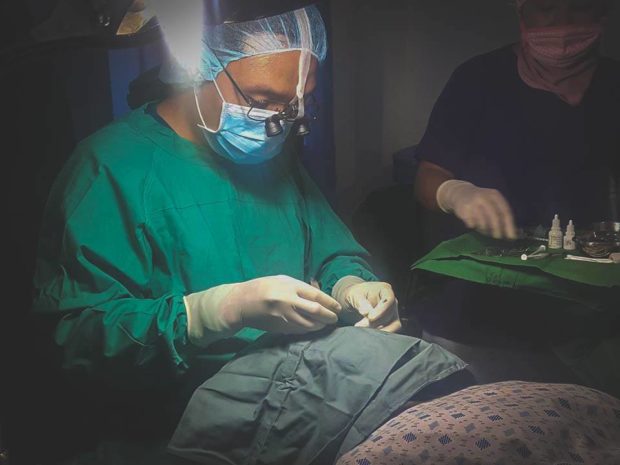
Ophthalmologist Dr. Norwin Detalla performs eye surgeries for free to Sulu residents during medical missions sponsored by Marine Battalion Landing Team-1. CONTRIBUTED PHOTO
(Last of three parts)
It is the joy of witnessing miracles of restored vision after each cataract surgery that makes ophthalmologist Dr. Norwin Detalla want to return for more volunteer missions.
But he is not joining just any humanitarian mission. At the time of the interview, he just returned home to Zamboanga City after doing volunteer work in the town of Siasi, the southernmost tip of Sulu.
It is not the usual destination even for volunteers — it is a remote island with people who badly need help. It may be rich in culture and natural resources, but it is enveloped by a stigma that comes from decades of violence and conflict.
“Yung nakikita ko yung dramatic effect ng after-cataract surgery. Yung big smiles ng patients na makakakita na sila. At first yung inaakay sila ng kapamilya nila, then after na-opera kahit wala nang hawak nakakalakad na sila. Priceless talaga yun for me,” he said.
(When I see the dramatic effect of the after-cataract surgery; the big smiles of patients when they will be able to see; at first seeing the family guide them and then after the operation, they are able to walk by themselves, those are priceless for me.”)
It was Detalla’s second time to join a humanitarian mission in Sulu organized by Marine Battalion Landing Team-1. He performs eye surgeries for no cost to patients. But he already finds it addicting.
“Nakaka-addict siya. Gusto mo na lang madami kang makikita na masaya after ng surgery…Kahit walang bayad, smile at thank you from grateful parents, solved na. Wala lahat ng pagod,” he said.
(It is addicting. You just want to see more people happy after surgery … Even without being, I am contented with the smiles and thank yous from grateful parents).
Detalla is not a stranger to volunteer assignments. During his residency training more than five years ago, he joined cataract surgical missions in the Visayas — Cebu, Negros Oriental, Masbate, Southern Leyte. But it was in Sulu that his skills were challenged.
In the Visayas, they are well taken care of, he said in Filipino. The venue is nice and all the needed materials are available. In Sulu, you have to accept whatever is available.
“I learned to improvise,” he said.
The Zamboanga-based doctor is part of a growing army of volunteers gathered by MBLT-1 to help the often-neglected people of Sulu. He didn’t expect it to be a life-changing experience.
“I get patients from Sulu and only those who have money visit my clinic. I hear a lot of stories na yun nga mahirap mostly ang mga tao dun (majority of the people there are poor). So it’s some sort of giving back to the community,” he said.
Detalla recounted that he almost did not join his first Sulu mission in Luuk last September because his mom died less than a month before. “Para maiba naman ang (To change the) environment kaya tumuloy ako (so I proceeded).
The medical mission in Siasi late November was conducted on the sidelines of the Football for Peace tournament, a program aimed at empowering the youth through sports.
READ: Football for Peace: Inspiring youths in conflict zones one goal at a time
Aside from the free eye surgeries in partnership with the Cataract Foundation Philippines, dental services, free check-up and minor surgeries were also offered.
Free medicines, eyeglasses, books, toys, slippers, meals, were also distributed during the day-long event.
Other doctors, nurses, and donors, who joined the mission, came from Manila, Cebu, Zamboanga City, Tawi-Tawi and Davao. They spent their own resources to join the mission and also looked for donations to secure the supplies.
Detalla’s advice to those who want to volunteer in areas less travelled? Get rid of your sense of entitlement and enjoy everything.
“Makikilala mo ang mga tao (You will get to know the people) from all walks of life and make friends with other volunteers,” he said.
There is also the thrill of exploring new places like Sulu, a tropical paradise amid the clan wars and violence.
As long as there is security then it is okay, he said.
[The MBLT-1 hopes to expand its services to its future missions. Interested volunteers and donors may contact the unit’s commanding officer Lt. Col. Stephen Cabanlet at slcabanlet@gmail.com.]